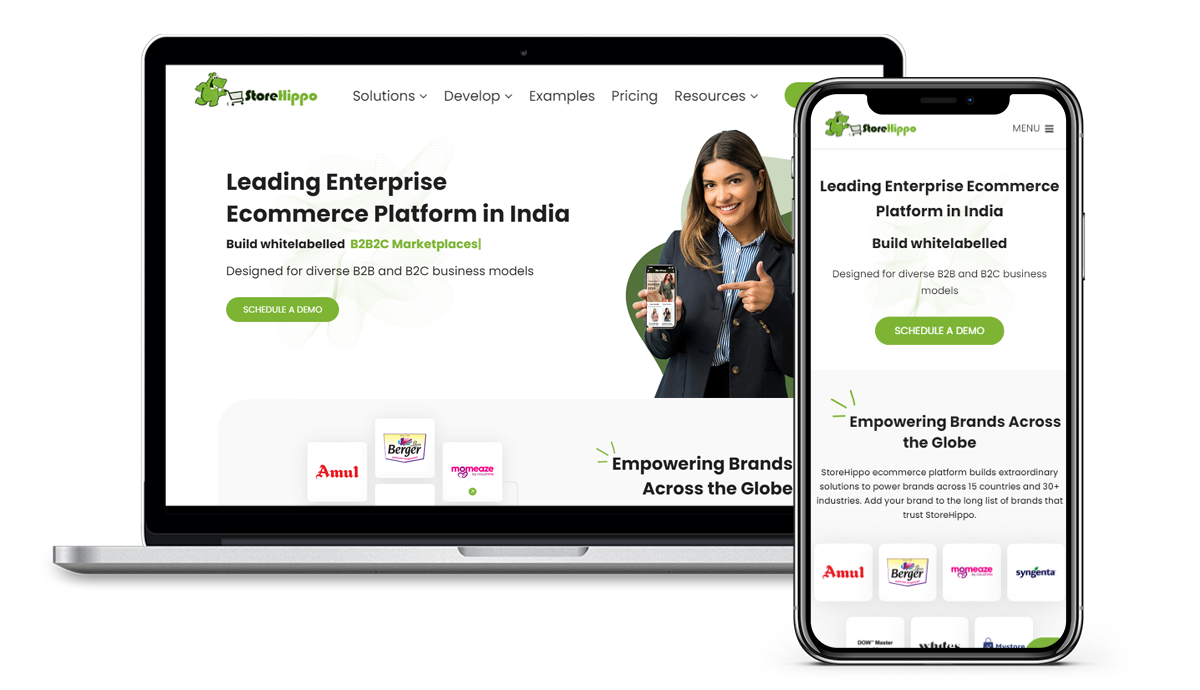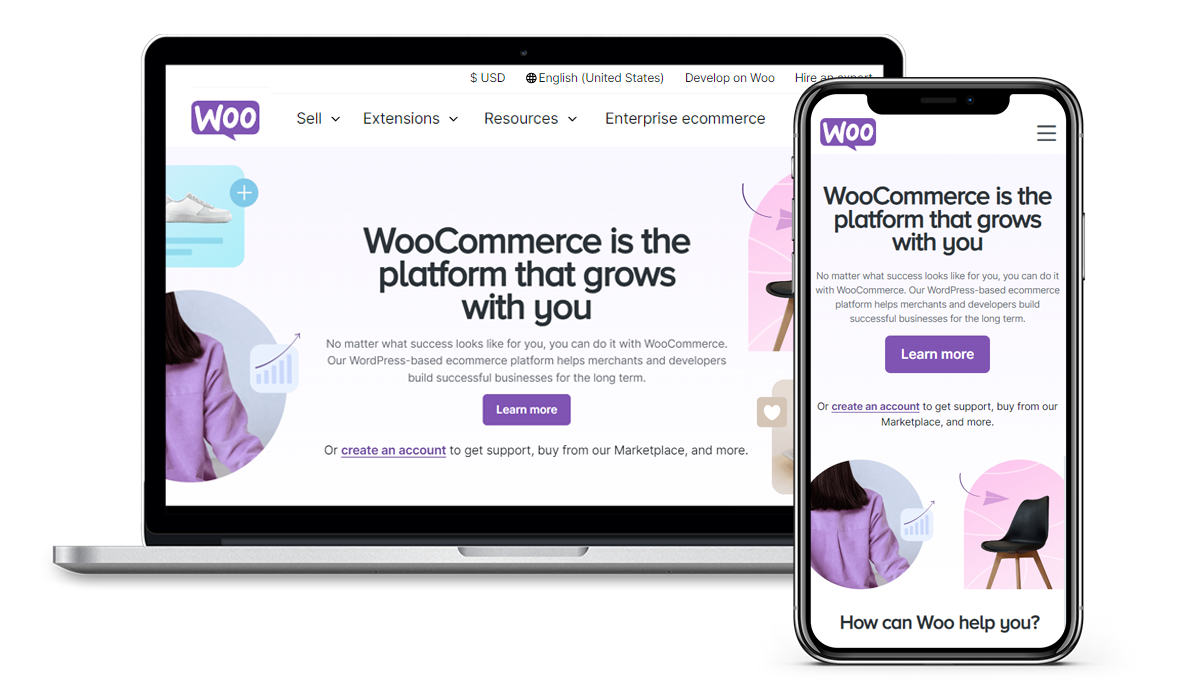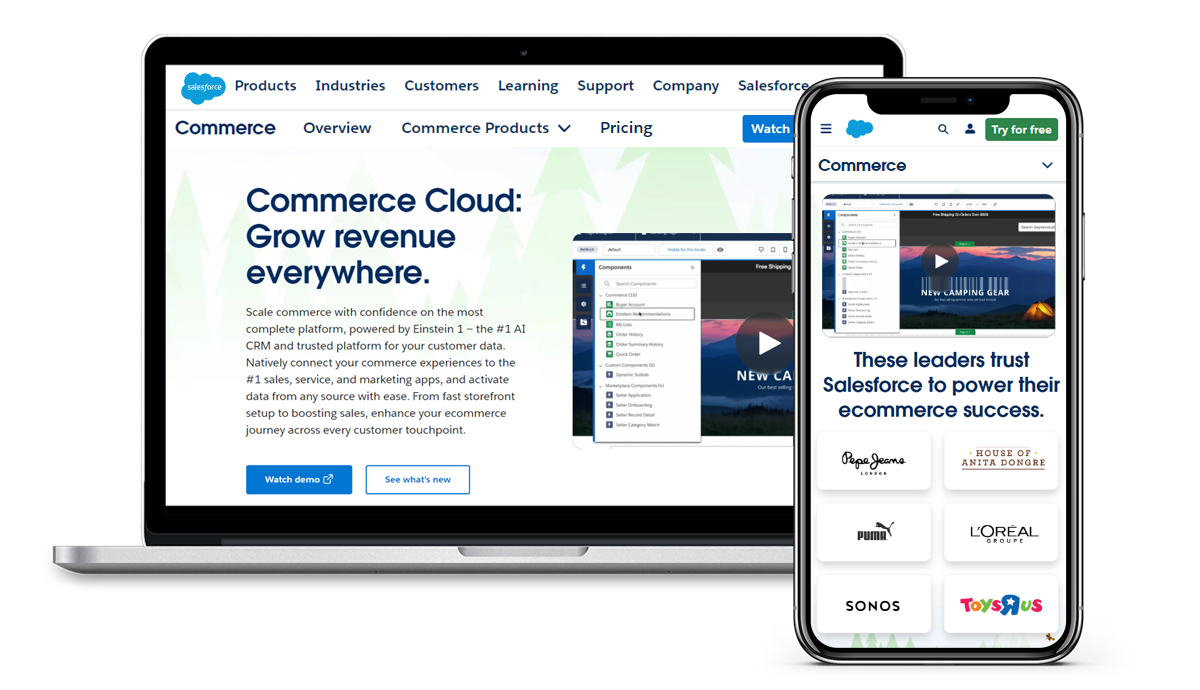Are you looking for the best Shopify alternatives for India?
Whether you are going online for the first time or looking for an alternative to your custom-built ecommerce solution, Shopify is often considered the go-to choice. However, whether it’s the penultimate solution for every business remains debatable.
With drawbacks like a steep learning curve, complex customizations, and costly add-ons, Shopify may not be the ideal fit for everyone.
Many strong Shopify competitors offer a far superior solution for Indian merchants across Industries and business models.
In this article, we bring you a detailed comparison of the top 7 Shopify alternatives in India, like StoreHippo, Magento, WooCommerce, Bigcommerce, and a few more.
Before we evaluate the Shopify alternative platforms in India, let us first identify the key trends in the Indian ecommerce market.
Table of Contents
- Future of Indian Ecommerce- Growth and Untapped Opportunities for Enterprises
- What is Shopify?
- 8 Reasons to Consider Shopify Alternatives for Your Business
- 7 Amazing Shopify Alternatives for Indian Enterprises in 2025
- 1. StoreHippo
- 2. Magento (Adobe Commerce)
- 3. BigCommerce
- 4. WooCommerce
- 5. Shift4Shop (3dcart earlier)
- 6. Salesforce Commerce Cloud
- 7. SAP Commerce Cloud
- Conclusion
Future of Indian Ecommerce- Growth and Untapped Opportunities for Enterprises
Driven by increased internet penetration, growth in orders from aspirational markets from Tier II+ cities, improved logistics, India is witnessing an unprecedented ecommerce growth. Also, forecasts predict a continued rapid expansion, offering immense opportunities for businesses to tap into a diverse and growing consumer base.
-Info.png)
Ecommerce Trends In India
- 1.8X growth in Indian ecommerce market value from 2021-2024
- 2.4X growth in Indian ecommerce market value from 2024-2030
Growth of digital buyers
- 350+ million digital buyers in India in 2024
- 428 million digital buyers in India by 2027
- 501 million digital buyers in India by 2029
Growth of Ecommerce User Penetration in India
- 22.1% in 2024
- 34.0% by 2029
Overall Ecommerce Growth Trends
- 63% of ecommerce orders come from Tier II and beyond cities and towns
- 73% of customers used multiple channels to make a purchase decision
- 3.5x higher engagement with omnichannel retail
- 60% ecommerce orders are placed via mobile
- 2X growth of quick commerce to overall ecommerce between 2023-2024
- 15 X growth forecasted for the D2C market from 2015 to 2025
- 19% is the CAGR for the D2C market between 2022-2030
B2B Ecommerce Growth In India
- 7.7 X growth in GMV of B2B manufacturing sector from 2022-2027
- 5X growth in the B2B retail distribution sector from 2022-2027
Source: Statista, Business Today, Redseer
Indian ecommerce is experiencing a growth trajectory like never seen before. To make the most of it enterprises need to register a strong digital brand presence powered by the best ecommerce platforms designed to cater to the unique needs of Indian consumers.
And this mandates the need to search for Shopify alternatives suited to the diverse needs of Indian ecommerce. Before we move to alternatives let us first understand Shopify and what it offers.
What is Shopify?
Shopify is an ecommerce platform that builds ecommerce stores for businesses. It offers tools to build an online store, manage products and fulfillment.
Shopify is a SaaS-based e-commerce software that offers cloud-based solutions and complete software maintenance.
Popular primarily with SMEs, Shopify also offers ecommerce solutions for enterprises. Following are the solutions offered by Shopify:
- Shopify- Designed for the needs of small businesses, Shopify comes with three pricing plans namely, Basic, Shopify, and Advanced. Each of these plans offers different features sets depending upon the size and requirements of small businesses.
- Shopify Plus- This plan is for enterprise businesses and offers advanced features for brands with high-volume transactions. Shopify Plus starts at $2,000/month and has custom pricing ( based on percentage of revenue) for higher transaction volumes.
- Shopify Lite- This adds a buy button to an existing website or blog. This plan is available only for existing Shopify merchants who want to change their existing plan. This plan does not offer an online store.
Shopify does not have any free plans and advanced features often require buying and syncing multiple third-party apps from independent providers.
8 Reasons to Consider Shopify Alternatives for Your Business
Despite being one of the top ecommerce platforms in India, Shopify falls short of meeting many essential requirements of Indian businesses.
Shopify users frequently report encountering various challenges with the platform on review sites. Additionally, the platform has a steep learning curve, requires coding skills to make changes and the cost snowballs due to additional apps and plugins required complex enterprise processes.
-Info1.png)
Following are the reasons why businesses in India should consider alternatives of Shopify to go online:
- Higher Costs
While Shopify India Basic plan begins at Rs. 1499/month, to build an online store which has more than a basic cart requires additional apps which eventually inflates the cost. Also, many competitors of Shopify offer basic features at a much lower cost.
- Customization Constraints
Customizing the Shopify platform for your enterprise can be complex due to restricted flexibility. Customizing your site and syncing third-party apps can be pretty complex and require in-depth coding knowledge. Finding workarounds to achieve desired functionality can become overwhelming and frustrating.
- Scalability Challenges
While Shopify offers scalability as the business grows users complain of slowdowns with large product catalogs or high traffic. Also, one of the top reasons for searching Shopify alternatives is quoted as challenges in handling extensive inventory and multi-channel sales.
- Lack of Niche Features
Shopify does not offer built-in features needed for advanced enterprise businesses. To achieve smooth workflows and operations for advanced or hybrid business models businesses need to rely on multiple apps and workarounds which makes the overall setup extremely complex.
- Difficulty Managing Complex Catalogs
Large catalogs with different product variants (size, colour, designs etc.) are complex to manage in Shopify as usually there are different cps or limits for products and their variants.
- Limited SEO Control
Though Shopify offers SEO tools, they are considered less comprehensive compared to other Shopify competitor platforms. Customizing meta tags, URL structures or optimizing site speed has limitations and can impact the overall online visibility.
- Issues With Local Integrations
Enterprises in India often start looking for Shopify alternatives as Shopify offers limited integration options with popular Indian payment gateways like Razorpay, UPI, or Paytm. Also there is a lack of tools for managing GST invoicing and compliance. Also, integrating with local delivery partners, offering COD support, or implementing regional languages is a challenge with Shopify.
- Overall Frustrating Experience
As enterprise businesses grow, they often seek more efficient solutions to manage app integrations and optimize their operations on Shopify. Enterprise merchants, after reaching a certain level of success, may explore Shopify alternatives that are better suited for high-volume stores.
If you are facing one or many of the above challenges, this blog will take you through a list of the best Shopify alternatives for high-volume stores and help you find the best-fit enterprise solution for your business.
7 Amazing Shopify Alternatives for Indian Enterprises in 2025
Looking for a more customised and flexible enterprise ecommerce platform that gives you alternatives for Shopify’s limitations?
Discover 10 widely used Shopify competitors by Indian enterprise brands that offer unique features and benefits and help you align your brand for the booming Indian markets.
1. StoreHippo

StoreHippo is a flexible, fully hosted and managed Shopify alternative for Indian businesses of every scale and industry. Built on mobile-first architecture StoreHippo has been offering plug-and-play ecommerce solutions to medium and large enterprises. Since its launch in 2015, StoreHippo has been offering a native comprehensive suite of tools for creating and managing online stores.
The decoupled headless architecture makes Storehippo one of the best ecommerce platforms to compete with Shopify in terms of customization, scalability and omnichannel capabilities. The platform supports B2C, B2B, D2C, B2B2C, Quick Commerce, Hyperlocal Ecommerce, multi-vendor marketplaces, location-based multi-store and many other business models making it a versatile solution for diverse business models.
Technology Used
StoreHippo is built on the MEAN stack (MongoDB, Express.js, AngularJS, Node.js) and MACH (Microservices, API-first, Cloud-native, Headless) architecture which gives creative freedom to build tailored solutions for Indian as well as global markets. Stores powered by StoreHippo leverage Progressive Web App (PWA) technology to offer a mobile-first experience with fast loading times and offline capabilities.
Pros
- Low-code, fully hosted, and managed platform with no development hassles.
- Flexible platform allows easy tweaks to both frontend and backend.
- Extensive customization options enable businesses to build tailored ecommerce ecosystems for their specific needs.
- Tweaking right from design and layout to complex business logic is possible.
- Inherent scalability accommodates business growth effortlessly and handles increased traffic without compromising performance.
- Built-in mobile app builder to create Android and iOS apps. Mobile-first PWA stores provide an app-like experience and faster performance even in tier II+ Indian towns and cities.
- Multilingual support for 100+ languages including RTL and regional Indian languages
- Built-in tax engine with full support for GST and GST-compliant invoicing
- 60+ pre-integrated domestic and international payment gateways with support for Paytm, UPI, COD, etc.
- SEO-friendly platform with a gamut of built-in marketing tools
- 30+ pre-integrated logistic providers for seamless shipping
- 300+ inbuilt features eliminate the need for paid apps or plugins.
- 120+ pre-integrations and seamless API-based integrations with preferred solutions
- Drag and drop design tools to create new design themes quickly
- The same backend logic and APIs can be used to create multiple frontends for a strong omnichannel presence
- A gamut of enterprise e-commerce features for B2B, B2B2C and other hybrid business models
- White-labeling options for enterprise ecommerce solutions
- Robust multi-level security with free SSL, PCI-DSS, ISO 27001:2013, SOC 2 Type 2 compliance
Cons
- While StoreHippo offers competitive pricing, certain advanced features and customizations are available only with higher tier plans
- It is one of the best Shopify alternatives for high-volume stores but offers POS integration but does not have its own POS system
- StoreHippo users have long been demanding support for marketing services
- Due to the huge suite of built-in features has a much smaller apps marketplace than Shopify
2. Magento (Adobe Commerce)

Magento is one of the top ecommerce platforms in India used widely by businesses of all sizes. The open-source eCommerce platform was launched in 2007 and was later acquired by Adobe in 2018. Magento has two versions namely;
- Magento Open Source - free and suitable for SMEs.
- Magento Commerce- the paid version for enterprises.
Magento is known for its flexibility, scalability and a large community of developers. Enterprises can build customized online stores tailored to their specific requirements using Magento. Enterprises well-versed with the use of other Adobe products and a strong IT team can find Magento to be a good Shopify alternative for high-volume stores.
Technology Used
Magento is built on PHP, using the Zend Framework. It uses MySQL for database management. Through its modular architecture Magento modular, allows extensive customization and integration with third-party services.
Pros
- As Magento is open-source you get full backend access for customisations.
- A vast developer network of over 260,000 contributes to additional platform functionalities.
- Access to a broad partner ecosystem for third-party apps and add-ons.
- Magento has powerful SEO tools, enabling businesses to optimize their stores for better SERP rankings and drive organic traffic.
Cons
- Magento Open Source requires a third-party web hosting provider or self-hosting o
- Enterprises need an IT setup to manage the patches and updates
- Cost of hosting, development and management add up to make Magento pricey
- Some enterprises complain that the despite being one of the best ecommerce platforms Magento becomes slow and buggy as the business scales
- Security breaches are common and a persistent concern
- Magento frequently upgrades the platform and replatforming from previous to new version is cumbersome, time taking and costly
3. BigCommerce

BigCommerce is a leading SaaS (Software-as-a-Service) Shopify competitor that offers a well-rounded solution for building and managing online stores. Launched in 2009, BigCommerce caters to both small businesses and large enterprises. It comes with a range of features, built-in SEO tools, marketing, and multi-channel selling, advanced filtering, price lists for pricing overrides, API calls for third-party integrations etc.
Technology Used
BigCommerce is built on the SaaS model and uses a combination of modern technologies, including HTML, CSS, JavaScript, and API integrations.
Pros
- BigCommerce is considered a Shopify alternative by Indian enterprises due to its ease of use and user-friendly interface
- Comes with a host of built-in tools to run and manage the business along with SEO, marketing and analytics. This reduces the need for third-party apps and add-ons.
- Offers scalable solutions to handle increased traffic and sales volume of growing business without compromising performance.
- Has support to enable selling across multiple channels, online marketplaces and social platforms.
- Robust security features (PCI compliance, automatic updates, and regular backups) and fully hosted are considered as one of the top Shopify competitors for Indian enterprises.
Cons
- Steep learning curve and needs developers with experience in handling the Big Commerce platform.
- Advanced enterprise-grade features like multi-store, multi-vendor or multilingual ecommerce need to be handled with workarounds as there is no built-in support for the same.
- Though it has customizable templates, it doesn’t provide the same level of customization as other Shopify alternatives like StoreHippo or Magento.
- Building tailored solutions with advanced features requires premium apps or workarounds that either cost extra money extra coding or both
- Requires better native m-commerce support and features despite claims of being built on mobile-first principles. Mobile responsiveness is inconsistent across themes.
- Themes are limited and the SEO feature leaves much for asking.
- Annual sales threshold for each tier. Though negotiable but can make the entire solution costlier than you initially thought it to be.
4. WooCommerce

WooCommerce is a powerful open-source plugin that is used by enterprise brands in India to convert their WordPress websites or blogs into fully functional ecommerce stores. WooCommerce has been very popular with brands that have been using WordPress as Shopify alternatives to build their websites and stores. WooCommerce is particularly suited for small to medium-sized businesses in India that already have a WordPress site.
Technology Used
WooCommerce is built using PHP, same as WordPress, which is also PHP-based. WooCommerce usesMySQL for database management and also has a wide range of third-party plugins and extensions for various functionalities.
Pros
- Completely free plugin for any WordPress site.
- Seamlessly integrates with the existing WordPress setup of enterprises.
- Due to the open-source nature the source code can be completely customised in terms of design, functionality, and user experience.
- Access to a wide range of free and premium extensions.
- Vast and active community support from developers as well as users who prefer WooCommerce as a Shopify alternative.
- Scalable solution that supports business growth in terms of customers, products etc. without compromising performance.
- Cost effective compared to other alternatives and competitors of Shopify as it comes free and also has many free extensions and plugins.
Cons
- Technical knowledge about WordPress is needed to utilize the full potential of WooCommerce.
- Though WooCommerce plugin is free, enterprises have to bear the cost of domain hosting, SSL certificates, upgrades etc.
- Multiple plugins are needed to add core features to WooCommerce
- Being open-source, WooCommerce is prone to security breaches and businesses need to maintain security, backups and protection against common threats.
- WooCommerce does not have dedicated customer support.
5. Shift4Shop (3dcart earlier)

Shift4Shop, has been offering enterprise ecommerce solutions since 1997. This Shopify alternative offers fully hosted ecommerce solutions with a strong focus on SEO. Shift4Shop is suitable for small to medium enterprises in India. Shift4Shop’s all-in-one ecommerce solution comes with a host of features and tools for businesses planning to grow their online presence and reach.
Technology Used
Shift4Shop offers cloud based, fully-hosted solutions using HTML, CSS, and JavaScript for front-end design, and also enables third-party service and software integrations through APIs.
Pros
- Built-in SEO features, likeGoogle AMP support, customizable URLs, and meta tags to improve their search engine visibility.
- Native ecommerce features that reduce the need for third-party apps or plugins and enable managing the store in a hassle free manner.
- Multi-channel selling including marketplaces like Amazon and eBay. Medium and small enterprises in India consider Shift4Shop as one of the best ecommerce platforms as it makes it easy to sell omnichannel including on social channels.
- Shift4Shop does not charge transaction fees on any of its plans, which is one of its most likable features leading to significant savings for businesses with high sales volumes.
- Support for over 100 payment gateways, giving enterprises the flexibility to choose the best as well as multiple payment options for their customers.
Cons
- Shift4Shop is feature-rich and hence its learning curve can be overwhelming for beginners, especially when compared with easy to use Shopify alternatives like StoreHippo.
- Theme customizations are limited in Shift4Shop despite offering a variety of themes. Large enterprises with extensive theme customizations requirements might find the platform limiting.
- Free themes are dated and lack the modern appeal and responsiveness required for enterprises.
- As businesses grow rapidly, some enterprises face performance issues, typically when extensive catalogs or features are added.
- Some customers have complained about the quality and responsiveness of support.
6. Salesforce Commerce Cloud

Salesforce Commerce Cloud is a cloud-based enterprise ecommerce platform designed to support businesses of all sizes, from small startups to large enterprises. Considered as a leading Shopify alternative by large enterprises, Salesforce offers a host of inbuilt tools, automation, easy customizations and efficient management. Originally known as Demandware, the enterprise platform was acquired by Salesforce in 2016. The Commerce Cloud suite integrates seamlessly with Salesforce’s other cloud services, and offers a comprehensive platform with CRM, marketing, sales, and ecommerce.
Technology Used
Salesforce Commerce Cloud uses JavaScript, HTML, and CSS for front-end development and supports integration with APIs .
Pros
- Comprehensive solutions for enterprises which includes CRM, marketing, and customer service and enables businesses to manage the complete business from one place.
- Omnichannel capabilities enable brands to build personalized multi-channel presence online, on mobile channels, social, and in-store.
- Salesforce’s Einstein AI offers advanced features to personalize product recommendations, predictive sorting and customer segmentation.
- Is flexible and scalable and supports rapid growth and seasonal spikes of large enterprises
- Offers extensive support, has a large developer community, and a wide range of third-party integrations through its Salesforce AppExchange.
Cons
- Small and medium businesses find Salesforce Commerce Cloud expensive compared to other Shopify alternatives for high-volume stores. The pricing is decided based on a percentage of revenue, which turns out to be a significant amount as the business grows.
- Advanced and deep integration capabilities often make Salesforce Commerce Cloud implementation complex and time-consuming. Experienced developers or a dedicated IT team is required to make the changes.
- The learning curve is steep due to the platform’s extensive functionality and feature set, necessitating substantial training to fully utilize the platform’s capabilities.
- While Salesforce Commerce Cloud is highly customizable, changes often need advanced technical knowledge, training or the help of Salesforce-certified partners. This inflates the overall cost.
- Enterprises using Salesforce Commerce Cloud may find themselves ending up using more and more of the Salesforce ecosystem, which limits their capabilities of integrating with non-Salesforce tools or ecommerce migration in the future.
- Some businesses also complain of lack of community support with very few agency partners helping with Salesforce integrations and development.
- Although a top ecommerce platform in India for enterprises, Salesforce becomes expensive due to frequent upsells to other solutions within the ecosystem.
7. SAP Commerce Cloud

SAP Commerce Cloud, earlier known as SAP Hybris, is a leading Shopify alternative used by high-volume B2B and B2C ecommerce businesses with multinational presence. SAP Commerce Cloud is a part of the larger SAP ecosystem and offers robust tools for large enterprise businesses planning to build a personalised multi-channel presence. SAP commerce cloud is a chosen option for brands looking for scalability, flexibility and integration with SAP’s enterprise solutions suite.
Technology Used
SAP Commerce Cloud is built on the Java Spring framework, it uses an open-source Kubernetes technology and runs on Microsoft Azure Hyperscale platform. It is one of the five components of the SAP C/4 HANA suite that also offers SAP solutions for marketing, sales, customer data and services.
Pros
- Powerful enterprise features tailored for complex business models of large enterprises with complex requirements.
- Omnichannel capabilities to deliver a consistent and unified multi-channel shopping experience.
- Seamless integration with the SAP Ecosystem to offer end-to-end business solutions.
- Safe data handling, marketing automation and multilingual support.
- Designed for large enterprises and hence offers a good Shopify alternative for high-volume stores that scale quickly.
- Extensive customization capabilities make it easy for enterprises to tweak the platform for their unique needs.
Cons
- Complex setup and management often require specialized knowledge or a dedicated IT team.
- Touted as a premium enterprise solution, SAP Commerce Cloud is pricey compared to biggest Shopify competitors in India.
- No standard pricing and negotiable prices as per requirements further make budget estimation difficult.
- Developer oriented model is complex for new users and has a steep learning curve due to extensive features and customization options.
- Enterprises with non-SAP systems may face integration challenges as the ecosystem is heavily dependent on SAP environment.
- Performance overhead particularly in complex or highly customized enterprise solutions due to comprehensive functionality.
- Lacks the level of analytics and reporting capabilities other Shopify alternatives provide in the same budget.
Conclusion
Though Shopify is a good ecommerce platform for many businesses, it is not the best ecommerce solution for every business in India. Indian markets demand agile development and rapid adoption and alignment with fast changing buyer requirements. The above comparison of the top ecommerce platforms in India for B2B and B2C businesses looking for alternatives to
Shopify highlights options that offer greater flexibility, localized features, and better scalability.
Selecting the right enterprise ecommerce platform is crucial for enterprise businesses in India looking to scale and grow quickly. While Shopify is a popular choice, alternatives like StoreHippo offer a comprehensive solution aligned with changing buyer, market, and compliance requirements of Indian markets.
With extensive support for Indian taxes, regional languages, omnichannel and mobile commerce, StoreHippo becomes a strong contender for being chosen as a Shopify alternative. Along with built-in features, support for local payments and logistics partners and seamless API-based integrations with local software, StoreHippo is an ideal fit for businesses looking for a competitive edge.
Ready to chart a new growth trajectory for your enterprise? Begin your 14-day StoreHippo free trial today and discover how it can empower your growth journey.


